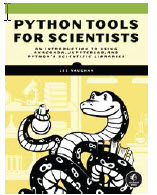Pivot Profile:
Lee Vaughan on the Intersection of Geology, Programming, and Authorship
By Caroline Wachtman

“80% of success is showing up,” says Lee Vaughan, a Houston-area geologist and successful author who literally wrote the book on Python programming applications for science and engineering. Vaughan has done far more than “show up” by becoming a self-taught Python programming expert, who continues to learn and grow his skills six years into retirement following a 31-year career as a geoscientist and geologic modeler at ExxonMobil.
Vaughan began his pivot to programming nearly 10 years ago when he was responsible for evaluating and creating proprietary reservoir modeling software. “I bought a book from Barnes and Nobel on my way home from work, sat on the couch, and figured it out,” says Vaughan of his self-taught path to learning Python. He quickly realized that there were few scripting resources for geoscientists and engineers beyond the “absolute beginner” books, so he wrote his own instructional book that was published in 2018. This book was followed by two more instructional books that offer scientists a toolkit on how to apply Python to their technical questions.
According to Vaughan, Python is the premier language for science and engineering and can be applied to clean and analyze large and complex datasets, create animated maps, and plot well logs among other uses. Despite these advantages, few geoscientists know how to use Python, says Vaughan. He encourages new users that Python is easy to learn, and that users can make progress at their own pace.
“Programming is 90% problem-solving,” says Vaughan. And geology is all about solving problems by asking questions and testing hypotheses. Just like it is important to think through multiple scenarios and test hypotheses when planning a well or building a geologic model, it is critical to test hypotheses when scripting. One technique is to use “linters,” programs that help the scripter find errors and apply best practices to their code.
ChatGPT and other AI tools have introduced new benefits and challenges to scripting. For example, users can quickly generate code using ChatGPT. However, only a trained scientist and/or programmer can determine whether the code is correct and appropriate for the problem being solved.
You can find Vaughan’s books in bookstores and online at Amazon.com. His latest book, Python Tools for Scientists, is designed as a starter kit for anyone interested in learning Python. He also publishes instructional articles online at https://medium.com/@lee_vaughan

